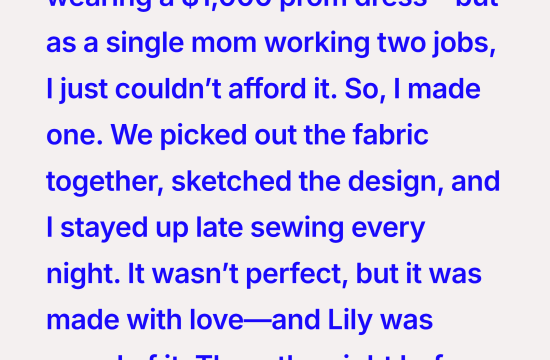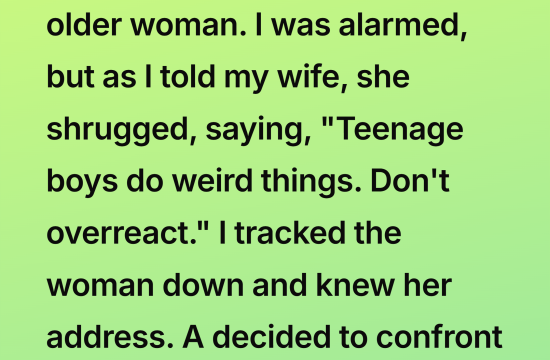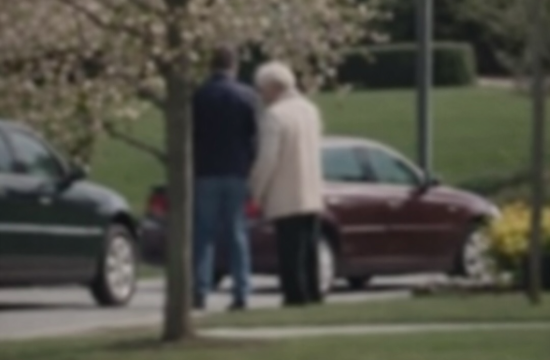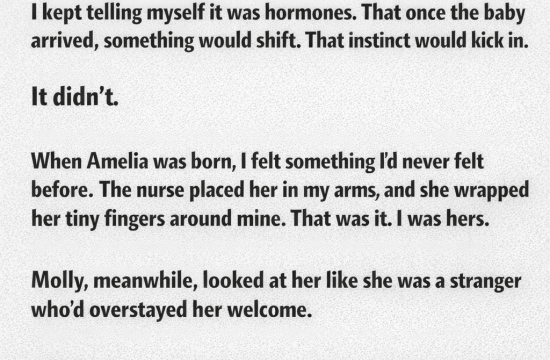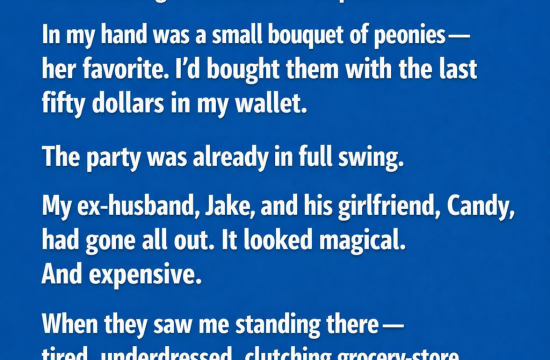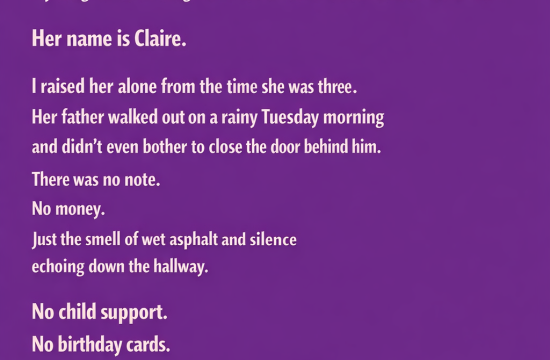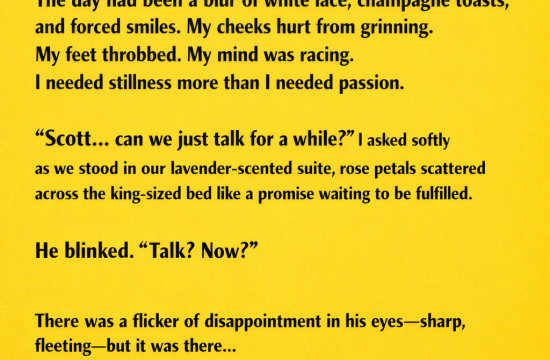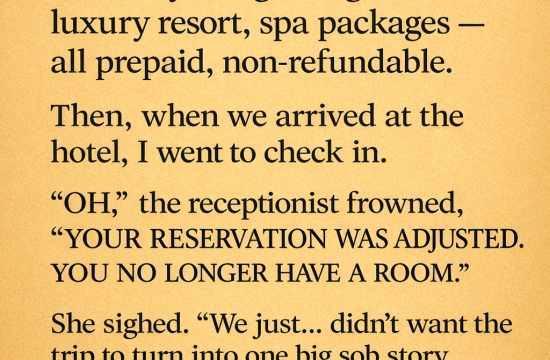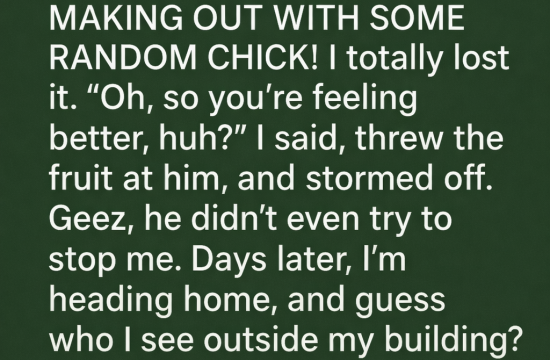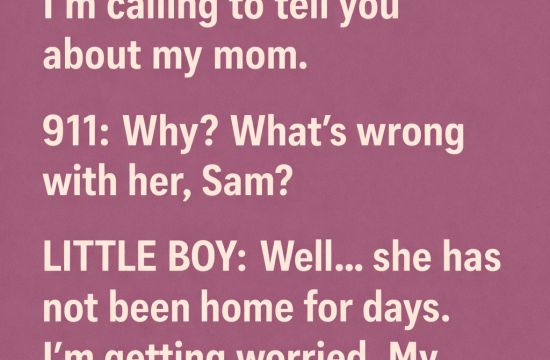At 40, I was diagnosed with heart failure. Life froze. My body betrayed me—and so did my wife. Emily said it was “too hard for Ben to see this.” She took our son and promised it was only temporary, that she just needed time. But the calls stopped. Then came the divorce papers. Emily had found someone else—someone “strong and healthy.” The courts gave her custody. I was too sick to fight.
But I did anyway.
Through pain and fatigue, I clawed my way back. I finished rehab. I got stronger. I got my life back—piece by fragile piece. And when it was finally my weekend to see Ben again, I drove to Emily’s house, full of hope.
I knocked. Mark, her new husband, answered the door.
Him: “You? You’re not seeing Ben.”
Me: “What? It’s my scheduled day.”
Him: “Did Emily not call? Actually, your son is…”
He trailed off, his eyes darting. “Your son is… busy,” he finished, avoiding my gaze. I heard cartoons playing inside. My heart began pounding—not from illness, but dread.
“Is he okay?” I asked, stepping forward. “Let me see him.”
Mark slipped outside and pulled the door shut behind him. “Emily says you’re not stable enough to be around Ben,” he muttered.
“I’m fine,” I replied, trying to steady my voice. “I finished rehab. My doctor cleared me. I’ve been sending Emily the reports.”
He gave a pitying sigh. “She thinks you’re a risk.”
The air left my lungs. A risk? I had survived hell for my son. I had done everything right.
“Please,” I whispered. “Just five minutes.”
Mark stepped back in and closed the door—softly, but it hit like a hammer. I stood there, paralyzed. I called Emily again and again. Straight to voicemail. I texted. No reply. Finally, I sank down onto the porch steps, tears spilling silently as neighbors walked past, offering only uncomfortable glances.
That night, alone in my small apartment, I stared at the fridge covered with Ben’s old drawings—rockets, dinosaurs, smiley faces in crayon. I picked up the teddy bear I’d given him for his third birthday and clutched it like it might somehow connect us.
The next morning, I called my lawyer.
“Omar, your case was closed months ago,” he said. “But… if your condition has improved, we can petition for a custody modification.”
I asked what it would take. He laid it out—proof of health, full-time employment, a suitable home.
I was working part-time at the library. It wasn’t enough.
So I applied for a full-time role at a bookstore. Management was hesitant because of my medical history, but I convinced them to give me a shot. I showed up early, stayed late, ran community events, started a children’s story hour. I poured myself into the job. Eventually, I was promoted to store manager.
I made my little apartment feel like a home. I painted a room in Ben’s favorite colors, filled it with books, toys, a tiny bed. I documented everything—pay stubs, medical reports, photos, and even videos of me reading bedtime stories.
Three months later, we filed the paperwork.
Emily called me—cold for the first time in months.
“What are you trying to do?” she snapped.
“I just want to see my son,” I said.
“Ben doesn’t even ask about you anymore.”
Her words sliced through me. But I stayed calm. “Let me find out for myself.”
She hung up.
At the first hearing, her lawyer made me out to be a ghost from the past—a man one heartbeat away from collapse. They showed photos of me when I was frail, near death. But I had my doctors testify. I brought my evidence. I showed the judge my life now: stable, structured, full of love.
Then came the most terrifying part. The judge wanted to hear from Ben.
We met in a quiet room at the courthouse. Ben looked older, taller, but his eyes were still that same soft brown. He fidgeted nervously.
“Mom says you’re sick,” he said. “Mom says you don’t want me.”
My throat tightened. “That’s not true,” I said gently. “I missed you every day. I got better so I could be with you.”
He looked up. “Really?”
“Really.”
The advocate asked if he’d like to see me again. Ben gave a small nod.
The judge approved supervised visitation.
Our first visit was awkward. Ben barely spoke. But I took him to the zoo, and he giggled at the penguins. By our third visit, he ran into my arms.
I documented everything. Each visit became proof—not for the court, but for Ben—that I was still his dad.
Then came the unexpected.
Emily called, her voice shaking. “I need your help,” she said.
Mark had lost his job, started drinking. He’d smashed a lamp during a rage—and Ben had been there.
“Can you take him tonight?” she asked. “Please.”
Of course, I said yes.
When I picked Ben up, he clung to me, wide-eyed and silent. Emily avoided my eyes. “I’m sorry,” she whispered.
I enrolled Ben in a new school. We had pancakes every morning. We read every night. Slowly, this apartment became our home. He stopped asking when he was “going home.” He called it our house. He started calling me “Dad” again.
With my lawyer’s help, I filed for emergency custody. The court granted it. Emily didn’t contest.
I was granted full custody.
Ben flourished. He joined little league, made friends, loved his teacher. One day, I found a crumpled drawing in his backpack. It showed him and me, smiling, with the words: “I’m glad you came back, Dad.”
I carry that note in my wallet.
Months later, Emily asked to see Ben. She’d been in therapy, found a new place, started fresh. I agreed. We began with short visits in public parks. Ben was cautious but curious. Eventually, he smiled at her again.
We started co-parenting—not perfectly, but with effort. We learned to prioritize Ben instead of our own hurt. There were missteps, but we kept showing up.
One day, his teacher told us, “Ben is one of the happiest, kindest kids I’ve ever met.”
Emily and I shared a look—a fragile truce, built from ashes.
That night, after Ben fell asleep, I sat on the couch, thinking about how far we’d come. I remembered the nights I cried alone, the hopelessness that nearly swallowed me. But I didn’t give up.
Now, my heart wasn’t just beating—it was full.
The greatest lesson I’ve ever learned?
Sometimes life breaks you so it can rebuild you stronger. And if you keep showing up, even after everything falls apart, love has a way of coming back.
If you’re struggling right now, don’t quit. Keep fighting—for your health, your peace, your people. Because sometimes, the very life you thought you’d lost… is just waiting for you to rise.


